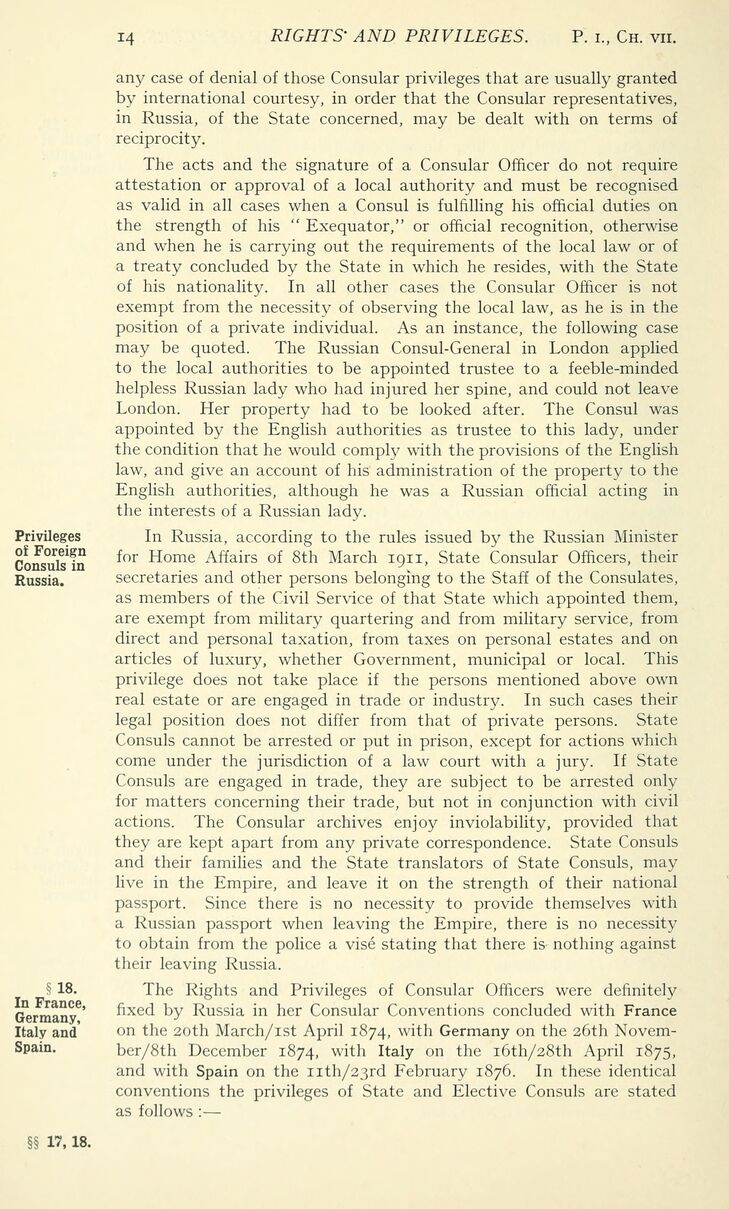
Full resolution (JPEG) - On this page / på denna sida - Pages ...

<< prev. page << föreg. sida << >> nästa sida >> next page >>
Below is the raw OCR text
from the above scanned image.
Do you see an error? Proofread the page now!
Här nedan syns maskintolkade texten från faksimilbilden ovan.
Ser du något fel? Korrekturläs sidan nu!
This page has never been proofread. / Denna sida har aldrig korrekturlästs.
14
RIGHTS’ AND PRIVILEGES. P. i., Сн. vn.
Privileges
of Foreign
Consuls in
Russia.
§ 18.
In France,
Germany,
Italy and
Spain.
arty case of denial of those Consular privileges that are usually granted
by international courtesy, in order that the Consular representatives,
in Russia, of the State concerned, may be dealt with on terms of
reciprocity.
The acts and the signature of a Consular Officer do not require
attestation or approval of a local authority and must be recognised
as valid in all cases when a Consul is fulfilling his official duties on
the strength of his " Exequator," or official recognition, otherwise
and when he is carrying out the requirements of the local law or of
a treaty concluded by the State in which he resides, with the State
of his nationality. In all other cases the Consular Officer is not
exempt from the necessity of observing the local law, as he is in the
position of a private individual. As an instance, the following case
may be quoted. The Russian Consul-General in London applied
to the local authorities to be appointed trustee to a feeble-minded
helpless Russian lady who had injured her spine, and could not leave
London. Her property had to be looked after. The Consul was
appointed by the English authorities as trustee to this lady, under
the condition that he would comply with the provisions of the English
law, and give an account of his administration of the property to the
English authorities, although he was a Russian official acting in
the interests of a Russian lady.
In Russia, according to the rules issued by the Russian Minister
for Home Affairs of 8th March 1911, State Consular Officers, their
secretaries and other persons belonging to the Staff of the Consulates,
as members of the Civil Service of that State which appointed them,
are exempt from military quartering and from military service, from
direct and personal taxation, from taxes on personal estates and on
articles of luxury, whether Government, municipal or local. This
privilege does not take place if the persons mentioned above own
real estate or are engaged in trade or industry. In such cases their
legal position does not differ from that of private persons. State
Consuls cannot be arrested or put in prison, except for actions which
come under the jurisdiction of a law court with a jury. If State
Consuls are engaged in trade, they are subject to be arrested only
for matters concerning their trade, but not in conjunction with civil
actions. The Consular archives enjoy inviolability, provided that
they are kept apart from any private correspondence. State Consuls
and their families and the State translators of State Consuls, may
live in the Empire, and leave it on the strength of their national
passport. Since there is no necessity to provide themselves with
a Russian passport when leaving the Empire, there is no necessity
to obtain from the police a vise stating that there is nothing against
their leaving Russia.
The Rights and Privileges of Consular Officers were definitely
fixed by Russia in her Consular Conventions concluded with France
on the 20th March/ist April 1874, with Germany on the 26th
Novem-ber/8th December 1874, with Italy on the i6th/28th April 1875,
and with Spain on the nth/23rd February 1876. In these identical
conventions the privileges of State and Elective Consuls are stated
as follows :—
§§ 17,18.
<< prev. page << föreg. sida << >> nästa sida >> next page >>